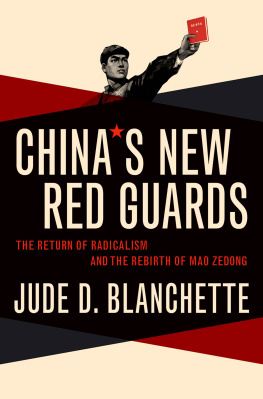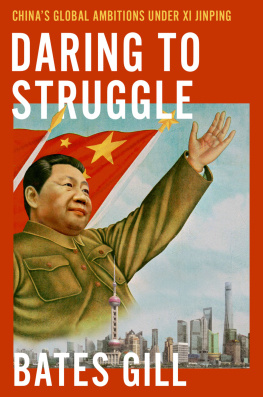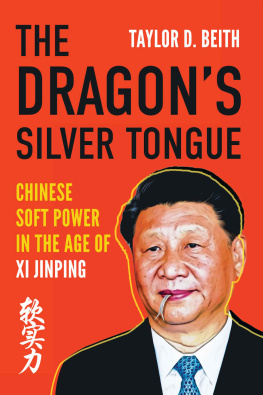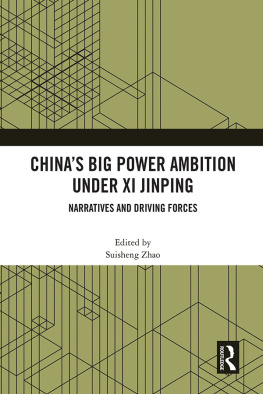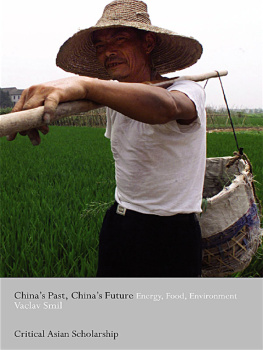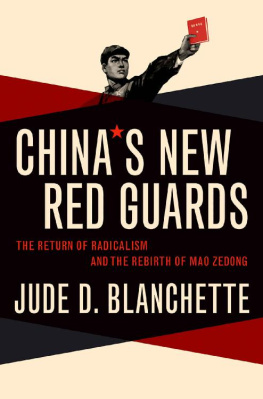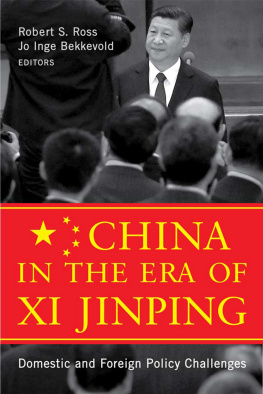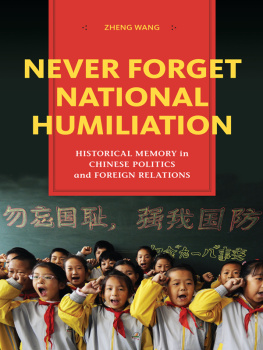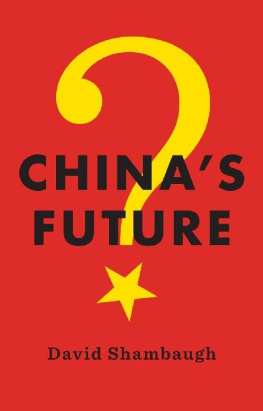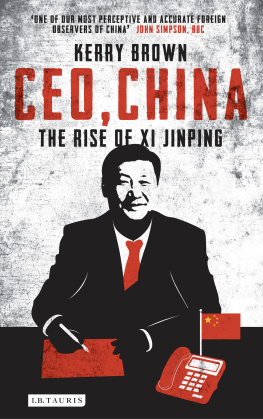Chinas New Red Guards


Oxford University Press is a department of the University of Oxford. It furthers the Universitys objective of excellence in research, scholarship, and education by publishing worldwide. Oxford is a registered trade mark of Oxford University Press in the UK and certain other countries.
Published in the United States of America by Oxford University Press
198 Madison Avenue, New York, NY 10016, United States of America.
Jude Blanchette 2019
All rights reserved. No part of this publication may be reproduced, stored in a retrieval system, or transmitted, in any form or by any means, without the prior permission in writing of Oxford University Press, or as expressly permitted by law, by license, or under terms agreed with the appropriate reproduction rights organization. Inquiries concerning reproduction outside the scope of the above should be sent to the Rights Department, Oxford University Press, at the address above.
You must not circulate this work in any other form and you must impose this same condition on any acquirer.
Library of Congress Cataloging-in-Publication Data
Names: Blanchette, Jude, author.
Title: Chinas new Red Guards : the return of radicalism and the rebirth
of Mao Zedong / Jude Blanchette.
Description: New York : Oxford University Press, [2019]
Identifiers: LCCN 2019002681 | ISBN 9780190605841 (hardcover)
Subjects: LCSH: ChinaPolitics and government2002 |
AuthoritarianismChina. | NationalismChina. |
Mao, Zedong, 18931976Influence.
Classification: LCC DS779.46 .B625 2019 | DDC 951.06/12dc23
LC record available at https://lccn.loc.gov/2019002681
Journalist Oriana Fallaci: Will Chairman Maos portrait above Tiananmen Gate be kept there?
Deng Xiaoping: It will, forever.
(Oriana Fallaci, Deng: Cleaning Up Maos Feudal Mistakes, Washington Post, August 31, 1980)
Contents


Like many first-time authors, Im now much more hesitant to critique any other fellow-book writer, for I understand just how difficult it is to put together 60,000 words of coherent and persuasive text, let alone to write an actually great work. This book, which I hope passes the persuasive bar, would have been worse were it not for the significant help, guidance, and intervention of a large number of people.
My first debt of thanks goes to the inestimable Susan Shirk, who not only gave me support and the confidence to think I could tell this story, but also helped connect me to her agent. And it was Jill Marsal, of the Marsal Lyon Literary Agency, who patiently and skillfully guided me through the proposal process. While working for Susan at UC San Diego, I had the distinct good fortune of having an office directly across from Barry Naughton, whom I consider one of the wisest observers of Chinas great economic and political transformations. Barry was unfailing in his willingness to discuss this project in its early phases, and later, provided some much-needed corrections as I managed to completely mangle the politics surrounding Dengs 1992 Southern Tour. Evan Osnos gave me a quick, but necessary, pep talk on why neo-Maoism was a worthy topic, and Jim McGregor gave me a much-needed kick-in-the-butt that remains greatly appreciated. David McBride and Emily Mackenzie at Oxford University Press were immensely patient and supportive throughout the project.
Of course, this project wouldnt have come to fruition without the conversations I had with the individuals mentioned in these pages. My own political outlook is much different from theirs, but they treated me with respect and honesty, and I hope I have repaid this kindness by accurately and sympathetically telling their story. Many of them must go unnamed, owing to the political sensitivities of neo-Maoism, and many of them would not agree to being lumped in with the neo-Maoists. Those I can publicly thank include Guo Songmin, Sun Jingxian, Sima Pingbang, Wang Xiaodong, Song Qiang, Liu Yang, Yang Fan, Zhang Hongliang, Cui Zhiyuan, and Li Kaicheng.
Other individuals who, in their own way, contributed greatly to this project include: Karl Gerth, Zhang Jian, Dai Qing, Wu Si, Mao Yushi, Anthony Garnaut, Brendan Mulvaney, Mark Wong, Fang Fang, Yuan Haiying, Ma Junjie, Hong Zhenkuai, Zhang Qingfang, Zhao Sile, Yang Kuisong, Greg Newburn, Dorothy Solinger, Thomas P. Bernstein, Joe Kelley, Rodney Faraon, Guang Lei, Richard McGregor, David Hoffman, Chun Han Wong, and Andrew Polk.
Id like to also thank those individuals who provided excellent feedback on earlier drafts of the manuscript, including Kaiser Kuo, Julia Lovell, Chris Buckley, Peter Braden, Matt Willis, Ryan Manuel, Joseph Torigian, Andrew Chubb, Alec Ash, Tristan Evans, and Ric Stockfis.
Id like to thank my parents, Joe and Peg, who have been my greatest champions and teachers. Thanks to my brother, Josh, who shares my passion for Star Wars and craft beer, and understands why its absurd that the mayor in Jaws remains the mayor in Jaws 2. Thanks to Shackleton, our black Labrador, who kept me company on many long days of writing. Finally, to Katie, the love of my life, my best friend, and my intellectual confidante. She read and improved nearly every word of the manuscript, and I decicate the book to her.
Chinas New Red Guards

China should maintain vigilance against the Right but primarily against the Left.
Deng Xiaoping, 1992
On April 22, 2018, on a desolate stretch of highway outside of North Koreas capital city, a bus carrying Chinese tourists plunged off a bridge, killing thirty-six, including four North Koreans.
In a rare move, North Korean state media publicly acknowledged the traffic accident, with news reports showing the countrys leader Kim Jong-un consoling the injured in a Pyongyang hospital.
The Twitter account of Chinas state-run TV station initially reported the accident, but the post was quickly deleted. A brief report on Chinas flagship nighttime news program showed footage of the upturned bus shrouded by pouring rain. Yet for the next week, the identities of the passengers remained a mystery.
This was unusual. Normally, when Chinese citizens are killed abroad, the Communist Party of China (CCP) goes to great lengths to publicize their deaths, perhaps to highlight how dangerous the outside world can be when compared to China, or to reinforce the paternal concern the party has for its own. But this time the authorities remained silent.
Did this mean a high-ranking Chinese official was among the deceased? Was there a connection to the recent tensions between North Korea and the United States? Was the bus crash staged?
Online, rumors spread with abandon. Some said Mao Zedongs grandson was among the victims. Others claimed the driver of the bus was drunk or that hed overloaded the vehicle with too many people and too much luggage.
When the list of the deceased was finally released more than a week later, the truth turned out more interesting than the rumors.

